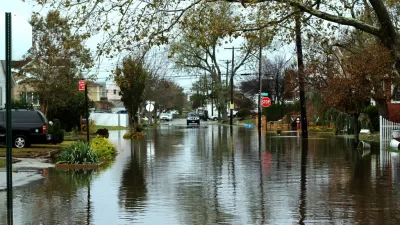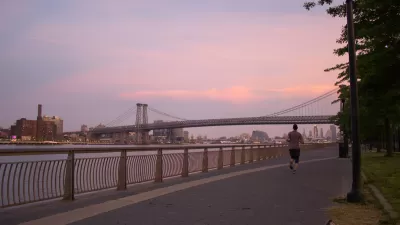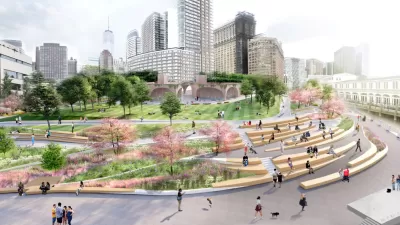Michael Kimmelman takes a hard look at the political and bureaucratic obstacles that stand in the way of a forward-thinking approach to rebuilding in the wake of Hurricane Sandy.
As New York moves to rebuild the homes, power lines, and subway stations ravaged by Hurricane Sandy last month, it's prudent to examine the reasons that major American cities are still so vulnerable to a natural disaster that returns so reliably every few years. As Kimmelman argues, there is no shortage of preventive measures that could have been taken to protect subway stations, power transformers, and other critical infrastructure.
"Hurricane Sandy was a toll paid for procrastination. The good news? We don’t need to send a bunch of Nobel laureates into the desert now, hoping they come up with some new gizmo to save the planet. Solutions are at hand. Money shouldn’t be a problem either, considering the hundreds of billions of dollars, and more lives, another Sandy or two will cost."
Rather, the barriers to good disaster planning lie in our democratic institutions, and an unwillingness to rethink where and how we settle. And so President Obama's promise to bring neighborhoods in Queens and on Staten Island back into shape was, in Kimmelman's words, "reflexive."
"At this point there’s no logic, politics and sentiment aside, to FEMA simply rebuilding single-family homes on barrier islands like the Rockaways, where they shouldn’t have been built in the first place, and like bowling pins will tumble again after the next hurricane strikes... Common sense dictates upgrading many of these projects to withstand floods but also devising new homes elsewhere for some residents. Cost-benefit analyses, long overdue, should answer tough questions like whether it’s actually worth saving some neighborhoods in flood zones. Communities like Breezy Point should be given knowledge, power and choice about their options, then the responsibility to live by that choice." And the willingness to ask people to reorganize the way that they live is political suicide for anyone with the authority to do so.
But Kimmelman offers a counterpoint from a time long gone, when autocratic decision-makers were not afraid to disrupt neighborhoods in a Machiavellian (and sometimes visionary) way: "During the last century Robert Moses, accumulating unbridled authority to get what he wanted done, bulldozed into existence parks and beaches, highways and housing projects by recklessly destroying old neighborhoods, starving mass transit, crushing opposition and 'hounding the people out like cattle,' as Stanley Isaacs, the former Manhattan borough president, said of the hundreds of thousands of mostly poor New Yorkers that Moses displaced."
In the end, it may come down to a question of whether we are willing to set aside questions of immediate social justice in pursuit of the long view.
FULL STORY: Vetoing Business as Usual After the Storm

Planetizen Federal Action Tracker
A weekly monitor of how Trump’s orders and actions are impacting planners and planning in America.

Maui's Vacation Rental Debate Turns Ugly
Verbal attacks, misinformation campaigns and fistfights plague a high-stakes debate to convert thousands of vacation rentals into long-term housing.

San Francisco Suspends Traffic Calming Amidst Record Deaths
Citing “a challenging fiscal landscape,” the city will cease the program on the heels of 42 traffic deaths, including 24 pedestrians.

Amtrak Rolls Out New Orleans to Alabama “Mardi Gras” Train
The new service will operate morning and evening departures between Mobile and New Orleans.

The Subversive Car-Free Guide to Trump's Great American Road Trip
Car-free ways to access Chicagoland’s best tourist attractions.

San Antonio and Austin are Fusing Into one Massive Megaregion
The region spanning the two central Texas cities is growing fast, posing challenges for local infrastructure and water supplies.
Urban Design for Planners 1: Software Tools
This six-course series explores essential urban design concepts using open source software and equips planners with the tools they need to participate fully in the urban design process.
Planning for Universal Design
Learn the tools for implementing Universal Design in planning regulations.
Heyer Gruel & Associates PA
JM Goldson LLC
Custer County Colorado
City of Camden Redevelopment Agency
City of Astoria
Transportation Research & Education Center (TREC) at Portland State University
Jefferson Parish Government
Camden Redevelopment Agency
City of Claremont





























